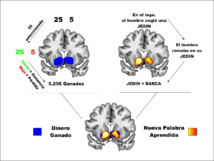Learning new words activates the brain reward circuits of human adults, according to a Spanish-German study, which studies the emotional impact of process of learning new languages. Before, it was believed that language acquisition was limited to childhood.
From the very first moments of our childhood, human beings are motivated to learn new words and their meanings. During this initial stage, first language acquisition occurs within a constant emotional interaction between parents and children. When adults, this relation between language acquisition and brain reward circuits have been barely studied.
Researchers from the University of Barcelona (UB), the Bellvitge Biomedical Research Institute (IDIBELL), and the Otto von Guericke University Magdeburg (Germany) have experimentally proofed that human adults new word learning process leads to the activation of not only the cortical circuits of the language, but also of the ventral striatum, one of the principal areas of the reward circuits. This finding confirms that, in adulthood, the motivation to learn a new language still remains, what helps us to acquire a second language.
The researchers have determined that the reward region that is activated is the same that answers to stimuli such as food or other pleasures, explains the UB in a press note of Tendencias21.
From the very first moments of our childhood, human beings are motivated to learn new words and their meanings. During this initial stage, first language acquisition occurs within a constant emotional interaction between parents and children. When adults, this relation between language acquisition and brain reward circuits have been barely studied.
Researchers from the University of Barcelona (UB), the Bellvitge Biomedical Research Institute (IDIBELL), and the Otto von Guericke University Magdeburg (Germany) have experimentally proofed that human adults new word learning process leads to the activation of not only the cortical circuits of the language, but also of the ventral striatum, one of the principal areas of the reward circuits. This finding confirms that, in adulthood, the motivation to learn a new language still remains, what helps us to acquire a second language.
The researchers have determined that the reward region that is activated is the same that answers to stimuli such as food or other pleasures, explains the UB in a press note of Tendencias21.



 English
English



